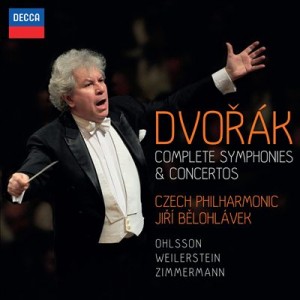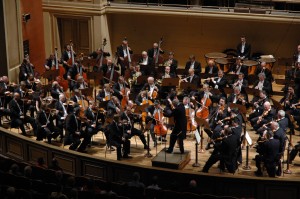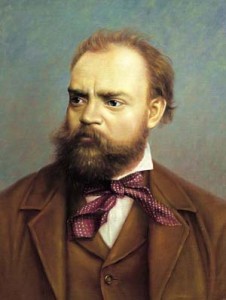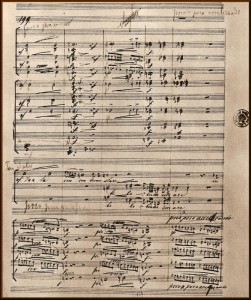THE HEART OF THE MATER
Decca just released a 6-CD box set by the Czech Philharmonic Orchestra (CPO) of the complete symphonies and concertos of AntonÃn Dvořák, and I don’t remember when I’ve been quite so taken with any interpretation of Dvořák’s work. Not only is the recording quality impeccable, but Maestro Jiřà BÄ›lohlávek clearly has innate understanding of the moods of Czech music. Dvořák was a genius at incorporating folk music into his symphonies, creating a lush new sound. Born in Prague, fellow countryman BÄ›lohlávek, who founded the Prague Philharmonia, has a profound perspicacity regarding the connection between Dvořák’s themes, harmonies, sonorities, melodies, tempos, and deep patterns.
 With passionate feeling and clean thought, CPO is indisputably one of the leading symphonic ensembles of the world. The combination of mellow sound, hot inflections, and keen insights singles it out among the greatest contemporary orchestras. Reunited with Chief Conductor BÄ›lohlávek since 2012, CPO has long been celebrated for their interpretations of their nation’s most beloved composer. The Philharmonic asserts a shimmering and sophisticated European sound, with a heartfelt, string-dominated focal point, vivid brass, and incomparable, distinctive woodwinds, which serve music of their native composers so well. You would be hard-pressed to find another orchestra of the same caliber—and the same intense empathy with Czech music—as this wonderful ensemble.
With passionate feeling and clean thought, CPO is indisputably one of the leading symphonic ensembles of the world. The combination of mellow sound, hot inflections, and keen insights singles it out among the greatest contemporary orchestras. Reunited with Chief Conductor BÄ›lohlávek since 2012, CPO has long been celebrated for their interpretations of their nation’s most beloved composer. The Philharmonic asserts a shimmering and sophisticated European sound, with a heartfelt, string-dominated focal point, vivid brass, and incomparable, distinctive woodwinds, which serve music of their native composers so well. You would be hard-pressed to find another orchestra of the same caliber—and the same intense empathy with Czech music—as this wonderful ensemble.
 To celebrate the CD release and their long association with AntonÃn Dvořák (who conducted the Philharmonic’s debut performance in 1896 in Prague), CPO is embarking on an 11-city U.S. tour beginning Nov. 4, 2014, and culminating with a concert in D.C. on Nov. 17, the 25th anniversary of the Velvet Revolution.
To celebrate the CD release and their long association with AntonÃn Dvořák (who conducted the Philharmonic’s debut performance in 1896 in Prague), CPO is embarking on an 11-city U.S. tour beginning Nov. 4, 2014, and culminating with a concert in D.C. on Nov. 17, the 25th anniversary of the Velvet Revolution.
Equally exciting is that their tour begins right in our own back yard. On Wednesday, November 5, 2014, at 7:30 at the Valley Performing Arts Center in Northridge, the orchestra will be joined by the Prague Philharmonic Choir, led by choirmaster Lukáš Vasilek, to commemorate the 110th anniversary of the death of the inimitable Czech composer, when they offer a rare performance of Dvořák’s Romantic choral masterpiece, Stabat Mater.
Dvořák’s mournful Stabat Mater—scored for soli, choir and orchestra—is based on a Roman Catholic poem that evokes the pain of the Virgin Mary upon the death of her son Jesus Christ. Deeply religious, Dvořák began the score for his monumental cantata after the death of his daughter Josefa. Infant mortality was very high at that  time and Josefa died only two days after her birth in 1875. Dvořák did not embark upon the composition immediately after this tragedy, but after an interval of six months, during which he completed the opera Vanda and wrote his Piano Trio in G minor and String Quartet in E major.
time and Josefa died only two days after her birth in 1875. Dvořák did not embark upon the composition immediately after this tragedy, but after an interval of six months, during which he completed the opera Vanda and wrote his Piano Trio in G minor and String Quartet in E major.
In its original form, the work only had seven movements with just piano accompaniment, essentially consistent with the final version you will hear. It is possible that, were it not for the deaths of two more of his children, which occurred the following year, Dvořák may not have returned to the work for the purposes of its revision. Yet when his 11-month-old daughter Ruzena died of poisoning in August 1877 and, within a month, his firstborn son Otakar succumbed to smallpox, Dvořák revised the work into the form we know today: He added another three movements (nos. 5-7) and rewrote the piano accompaniment for orchestra, completing the oratorio in November 1877.
 Characteristic of the entire piece is its unusually sublime musical expression and its solemn intellect, free of any form of triviality or superficial effects. The score is particularly valued for its beauty, deliberately drawing on the combination of human voices and rich orchestral color. The entire structure of the work, divided into ten parts, represents a majestic, expressive arc, extending from the image of death and suffering, and feelings of apprehension and painful meditation, to the final, life-affirming catharsis. Although the literary source of the oratorio speaks to the darker aspects of human life, the overall tone of the work—typical of Dvořák—is generally positive. Despite the personal tragedy he had experienced shortly before, the composer refuses to allow despair to overwhelm him; his music reflects neither resignation nor hopelessness. In this, Dvorak’s masterpiece, we look through a veil of tears and see faith in life.
Characteristic of the entire piece is its unusually sublime musical expression and its solemn intellect, free of any form of triviality or superficial effects. The score is particularly valued for its beauty, deliberately drawing on the combination of human voices and rich orchestral color. The entire structure of the work, divided into ten parts, represents a majestic, expressive arc, extending from the image of death and suffering, and feelings of apprehension and painful meditation, to the final, life-affirming catharsis. Although the literary source of the oratorio speaks to the darker aspects of human life, the overall tone of the work—typical of Dvořák—is generally positive. Despite the personal tragedy he had experienced shortly before, the composer refuses to allow despair to overwhelm him; his music reflects neither resignation nor hopelessness. In this, Dvorak’s masterpiece, we look through a veil of tears and see faith in life.
The Valley Performing Arts Center has proven itself time and again to be one of the best venues for music concerts in this or any other city. Not only is the gorgeous hall blessed with terrific sight lines and extraordinary acoustics, but the ticket prices are basically half of what you would pay for classical music in many other arenas.
 Czech Philharmonic Orchestra
Czech Philharmonic Orchestra
Jirà Belohlávek, Conductor
Prague Philharmonic Choir
Lukáš Vasilek, choirmaster
DVOŘÃK Stabat Mater, Op. 58
Valley Performing Arts Center
Wed, November 5, 2014 at 7:30 pm
for tickets, call (818) 677-3000
or visit www.ValleyPerformingArtsCenter.org
